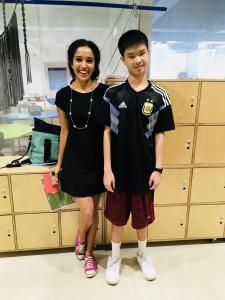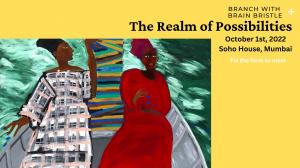A Letter From the CEO of BrainBristle
November 10, 2022Human Rights - Social Gov originally published at Human Rights - Social Gov
Event with BrainBristle

Devangana at break from BrainBristle

Devangana with a student
A letter was written by the young, CEO of BrainBristle questioning global thinkers and media narratives for those diagnosed on the spectrum of autism.
— Devangana
MUMBAI, MAHARASHTRA, INDIA, October 26, 2022 /EINPresswire.com/ — This is a letter written by the CEO of BrainBristle questioning global thinkers, educators, politicians, and those interested in the national distribution of our GDP towards charities, organizations, and funds, on how shifting media landscapes could drastically shift global wealth, toward empowerment and equanimity of class, race, and gender.
Devangana wrote, ‘I’d last written to you in March about all that was just beginning to brew at BrainBristle, [a think tank to change narratives for children diagnosed on the spectrum of autism] We were so young then, barely babbling, I was SO excited then, barely a CEO.
A few kids I started with then, are still with me, some I lost in my growth transition from my office in Bandra, to our new headquarters at Soho House, Bombay.’
She goes on to talk of her experience of working with children on the spectrum for what felt like a lifetime, she says,
‘It gave me some fundamental ideas, that I had played with earlier, but had never had the luxury of full fruition [since I was never really before a CEO]. Today, as someone with full reigns of BrainBristle, I wish to simply create an example with 10-12 children on the spectrum of autism in Bombay, on the possibilities of what we might not have fully explored for children diagnosed autistic’
A few principles I have established in my work, which I reiterate to myself, as I function, fall, learn and evolve-
1. Almost 70-80 percent of teacher time is spent with children on the spectrum of autism catering to managing their core behaviours of ADHD, violence, stimming, lack of socio-emotional reciprocity, building relationships, and their multi-sensory needs rather than their education.
To mitigate some of this noise, I choose the first table to the left, with two tall lounge chairs, a bookshelf to our side, and a sturdy coffee table, in the busy lounge as my workstation, to a] make exit easy b] distraction-free work simple c] learn and break behaviours through osmosis of their surroundings and d] to stimulate their senses with beauty, banalities, niceties, good manners, clean linen, high fashion, freshly fried fries, the smell of coffee 3/4 times a week- and then leave the rest of the exposure they need to our world and what it’ll bring along for leftovers.
2. Money spent and raised for teaching tools for children on the spectrum is more zeros than I can count on my two hands, so just as I had done for the last many years, I make my curriculum and my teaching tools what you and I consume daily, to play with the deep-rooted emotionality and sullenness that I find with most kids on the spectrum.
What usually consumes us is-
British books mocking concepts like dating, mindfulness, and beauty; interesting, engaging news of all kinds; The Office reels and comic strips; Bollywood; beautiful writing; badly structured writing; beautiful French, Greek, Italian, Indian, Black history and art books; math through the stock market, through football, ManU/ Liverpool/ Arsenal/ Chelsea rivalries; reading likes and comments on popular people’s posts; reading love stories, [a genre I personally enjoy]; exposing them to the visible lives of big people from across the world; one of my kids calls them a menu card, I take an oath to never, ever repeat anything they say to anyone I know.
3. The first signs of autism are a lack of eye contact and socio-emotional reciprocity, back in 2009, I used to take my kids on busy trains in New York, banks in Hong Kong, local Chinese hot-pot restaurants, busy shopping districts, Buddhist monasteries, award shows, big conferences to shake them into reciprocal attention, but this exposure still didn’t feel enough to help them grow.
So, the one thing I couldn’t do well enough until now by myself, that the peeps at Soho House do is, it turns them to decently mannered, social toes.
I worry soon paid paparazzi will be papping my cutesters with Bombay’s glitterati around town- my child-protection radar is always on HIGH ALERT, their parents nudge me for that, they say, ‘Khelne do, na’ [‘Let them play, please’].
I’ve established, I’m the absolute least fun teacher to be around.
4. What will sell? With every other child we raise, we think of their careers, ambitions, their life paths logically, we think about will their professions yield them reasonable respect, respite, and an income- I have no idea why our radar goes south when it comes to children on the spectrum of autism.
I solely and only teach them what will sell well – not sell because they’re autistic, but sell because it is perfect, it is excellent- music, dance, art, filmmaking, photography, writing, poetry, prose, bits of history, math, experiments, memes, cartooning, design, everything I can possibly, humanly learn, source or teach that could have a larger social and market value- I teach it to them- so one day, they’re known for more than their values, more than their goodness, more than their godforsaken autism, so one day they are known for a minuscule mark in the economic, political and social structures of this world.
On these few principles, I will play and see how long we evolve, grow and go, please keep writing in and sending ideas, suggestions, and thoughts.
All my love and respect, I hope my kids will soon be young people you know but don’t even realize that they grew partially crookedly crankily on a lounge chair over flat whites and sweet potato fries and my fourth paranoid diet coke.
All my love and best wishes,
Devangana
Devangana Mishra
Brain Bristle
email us here
Visit us on social media:
LinkedIn
Other
![]()
Article originally published on www.einpresswire.com as A Letter From the CEO of BrainBristle
Human Rights - Social Gov originally published at Human Rights - Social Gov





